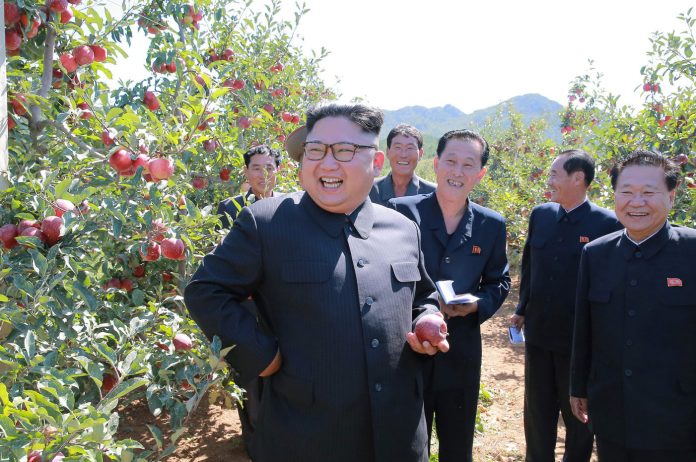
North Korean fruit and vegetable growers have suffered damage to their crops due to unseasonably low temperatures in March and April, Daily NK has learned.
“Orchards in Kaechon, Yangdok, Pukchang and mountainous areas in South Pyongan Province have experienced serious crop damage due to low temperatures, causing growing anxiety among farmers,” a reporting partner in the province told Daily NK on Monday, speaking on condition of anonymity for security reasons.
“The damage was especially bad in Kaechon and Pukchang. In Kaechon, orchard work teams at just about every farm reported seeing damage.”
Fruit trees bloomed prematurely due to unusually high temperatures in March, and then temperatures dropped dramatically in April. The reporting partner pointed to this extreme fluctuation in the weather as the reason behind the widespread crop damage.
Fruit trees and other agricultural crops can be severely impacted by dramatic temperature drops after floral opening. Low temperatures during blooming or in the early stages of fruit development can cause trouble during fruit formation and maturation later on. In this particular case, fruit trees did not bloom at the usual time and ended up dropping their flowers too early. Prematurely shedding flowers can hamper fruit setting (the formation of fruit) and growth, resulting in both a lower quantity and quality of fruit during the harvest.
According to weather forecasts for North Korea provided by the South Korean Meteorological Administration’s Weather Information Portal, Yangdok (in South Pyongan Province) recorded a daytime high of 25 degrees Celsius in early April, only to then experience a cold spell with the daytime high falling 10 degrees Celsius and lows plummeting to sub-zero temperatures. Even after that, temperatures fluctuated significantly.
“Apple trees were most impacted by the fluctuations, while peaches and plums were also significantly affected,” the reporting partner told Daily NK.
Vegetable farmers also suffer significant crop damage
North Korean vegetable farmers also suffered immensely as the result of wrong-headed instructions handed down by government authorities, the reporting partner claimed.
“Vegetables, potatoes, and corn crops suffered due to hasty planting in compliance with orders to start the farming process earlier than normal,” he said. “There is anxiety that the low temperatures will lead to a lower harvest of not just fruit but also vegetables.”
According to him, the North Korean authorities hastily issued orders without properly considering climate conditions and crop growth periods, leading farmers to suffer a direct blow when temperatures suddenly dropped.
On May 18, Rodong Sinmun reported that “activities to forecast crop growth and development are essential to developing agro-technical policies in advance and implementing these policies at the ideal time” and that “with the disasters caused by abnormal weather phenomena in recent years becoming more frequent, we must work to carefully develop policies to protect crops and make our fertilization and management practices more scientific, which means that forecasts regarding crop growth and development are becoming even more important.”
In short, North Korean authorities are emphasizing the importance of making crop growth and development forecasts more scientific in order to ward against climate-caused disasters. The damage wrought on farms, however, appears due to the government’s hasty push to increase agricultural production while disregarding proper judgements regarding farming conditions on-the-ground.
Translated by Rose Adams. Edited by Robert Lauler.
Daily NK works with a network of reporting partners who live inside North Korea and China. Their identities remain anonymous due to security concerns. More information about Daily NK’s reporting partner network and information gathering activities can be found on our FAQ page here.
Please direct any comments or questions about this article to dailynkenglish@uni-media.net.


















